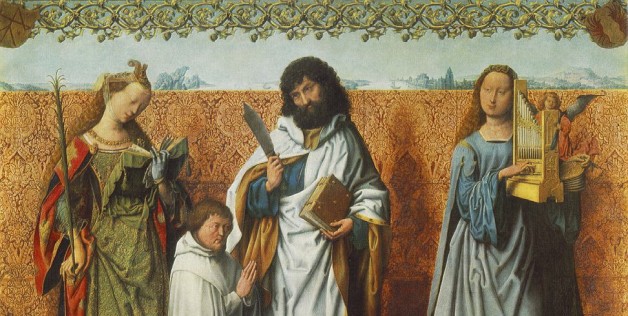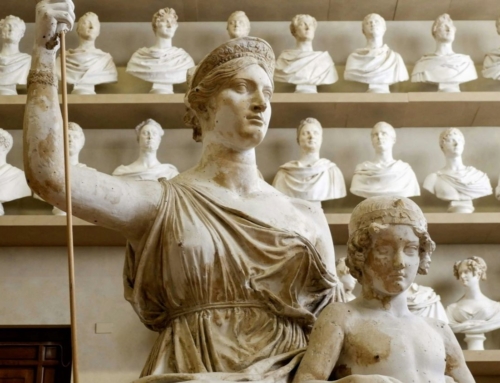And Philip found Nathaniel, and told him, “We have discovered who it was Moses wrote of in his law, and the prophets too; it is Jesus the son of Joseph, from Nazareth.” When Nathaniel asked him, “Can anything that is good come from Nazareth?” Philip said, “Come and see.” Jesus saw Nathaniel coming towards him, and said of him, “Here comes one who belongs to the true Israel; there is no falsehood in him.” Nathaniel said to him, “How do you know me?” Jesus answered him, “Before Philip called you, when you were under the fig tree, I saw you.” Nathaniel answered him, “Rabbi, you are the Son of God! You are the King of Israel!” Jesus answered him, “Because I said to you, I saw you under the fig tree, do you believe? You shall see greater things than these.”
—John 1:45–50
In proclaiming this Gospel passage today, on the feast of the Apostle Bartholomew, the Church follows and endorses a long tradition according to which Bartholomew and the disciple here referred to as Nathaniel are actually the same person. There are many reasons for supposing that this tradition is sound. First of all, without explicitly calling Nathaniel apostolos—a word which, in any case, never appears in the Fourth Gospel—John certainly portrays him in ways that strongly suggest he was in fact one of the Twelve (cf. Jn 21:2). Yet, since the other Evangelists do not include Nathaniel in their lists of the Apostles, nor otherwise speak of him, we may reasonably conclude, not that they were ignorant of him, but that they referred to him by another name.
Now, there are only four Apostles of whom John makes no mention at all—James the Less, Matthew, Simon the Zealot, and Bartholomew—and of these Bartholomew is (we might say) the most likely Nathaniel. Bartholomaios, after all, is not even a proper name, but only a patronymic, meaning “son of Tholomai.” Moreover, just as John portrays Philip and Nathaniel as friends in the passage above, so Philip and Bartholomew are paired in the Gospels of Matthew and Luke.
We may safely surmise, then, that Jesus was speaking of Bartholomew when he uttered the words, “Here is a true Israelite, in whom there is no guile,” or, as the Knox translation has it, “Here comes one who belongs to the true Israel; there is no falsehood in him.” Reminiscent of Psalm 32 (“Blessed is the man in whose spirit there is no deceit”) and of Revelation’s description of the blessed (“In their mouth no lie was found”), this is certainly one of the most beautiful compliments Christ ever lavished upon a mere man. It has its rival, however, in Matthew and Luke, where Jesus says of the centurion: “Truly, I say to you, not even in Israel have I found such faith” (Mt 8:10).
The Israelite without guile and the Gentile of great faith: each receives Christ’s signal approbation, and of each we are given a small, though illuminating, glimpse. Indeed, each seems to exhibit some of the other’s characteristic virtue. As Bartholomew’s guilelessness first disposes him to speak his mind without hesitation (“Can anything good come from Nazareth?”) and then leads him to a ready and willing expression of faith in Christ (“Rabbi, you are the Son of God!”), so the centurion’s faith first disposes him to lay his troubles before Jesus and then to respond to our Lord’s offer of help with such extraordinary simplicity and guileless sincerity:
As he entered Capernaum, a centurion came forward to him, beseeching him and saying, “Lord, my servant is lying paralyzed at home, in terrible distress.” And he said to him, “I will come and heal him.” But the centurion answered him, “Lord, I am not worthy to have you come under my roof; but only say the word, and my servant will be healed. For I am a man under authority, with soldiers under me; and I say to one, ‘Go,’ and he goes, and to another, ‘Come,’ and he comes, and to my slave, ‘Do this,’ and he does it.” When Jesus heard him, he marveled, and said to those who followed him, “Truly, I say to you, not even in Israel have I found such faith.” . . . And to the centurion Jesus said, “Go; be it done for you as you have believed.” (Mt 8:5–10, 13)
It would seem that straightforward, uncalculating honesty is the natural accompaniment of genuine faith.
We do not know much else about Saint Bartholomew. The early Church historian Eusebius (d. 339) says that when Pantaenus (the second-century scholar and teacher of Clement of Alexandria) went to evangelize India, he discovered that a version of the Gospel of Matthew had preceded his arrival. The locals said that their ancestors had received it from none other than Bartholomew.
✠
Image: Master of the St. Bartholomew Altar, St. Agnes, St. Bartholomew, and St. Cecilia (St. Bartholomew holds a knife, the instrument of his martyrdom.)







